综合英语4 unit1教案
- 格式:doc
- 大小:22.50 KB
- 文档页数:2
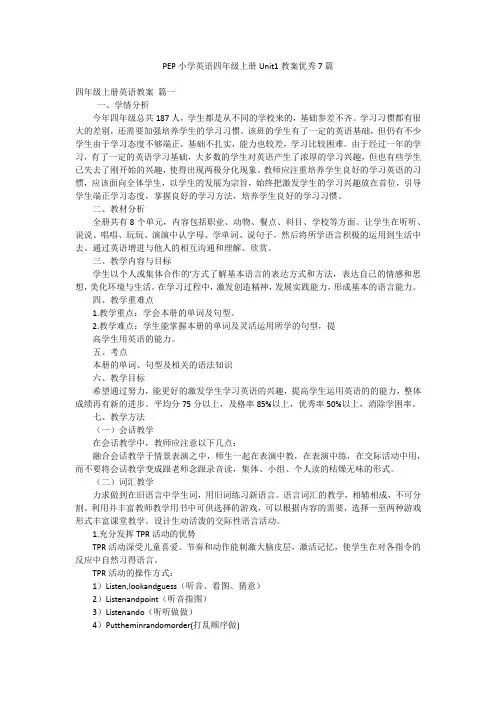
PEP小学英语四年级上册Unit1教案优秀7篇四年级上册英语教案篇一一、学情分析今年四年级总共187人,学生都是从不同的学校来的,基础参差不齐。
学习习惯都有很大的差别,还需要加强培养学生的学习习惯。
该班的学生有了一定的英语基础,但仍有不少学生由于学习态度不够端正,基础不扎实,能力也较差,学习比较困难。
由于经过一年的学习,有了一定的英语学习基础,大多数的学生对英语产生了浓厚的学习兴趣,但也有些学生已失去了刚开始的兴趣,使得出现两极分化现象。
教师应注重培养学生良好的学习英语的习惯,应该面向全体学生,以学生的发展为宗旨,始终把激发学生的学习兴趣放在首位,引导学生端正学习态度,掌握良好的学习方法,培养学生良好的学习习惯。
二、教材分析全册共有8个单元,内容包括职业、动物、餐点、科目、学校等方面。
让学生在听听、说说、唱唱、玩玩、演演中认字母、学单词、说句子,然后将所学语言积极的运用到生活中去。
通过英语增进与他人的相互沟通和理解、欣赏。
三、教学内容与目标学生以个人或集体合作的'方式了解基本语言的表达方式和方法,表达自己的情感和思想,美化环境与生活。
在学习过程中,激发创造精神,发展实践能力,形成基本的语言能力。
四、教学重难点1.教学重点:学会本册的单词及句型。
2.教学难点:学生能掌握本册的单词及灵活运用所学的句型,提高学生用英语的能力。
五、考点本册的单词、句型及相关的语法知识六、教学目标希望通过努力,能更好的激发学生学习英语的兴趣,提高学生运用英语的的能力,整体成绩再有新的进步。
平均分75分以上,及格率85%以上,优秀率50%以上,消除学困率。
七、教学方法(一)会话教学在会话教学中,教师应注意以下几点:融合会话教学于情景表演之中,师生一起在表演中教,在表演中练,在交际活动中用,而不要将会话教学变成跟老师念跟录音读,集体、小组、个人读的枯燥无味的形式。
(二)词汇教学力求做到在旧语言中学生词,用旧词练习新语言。
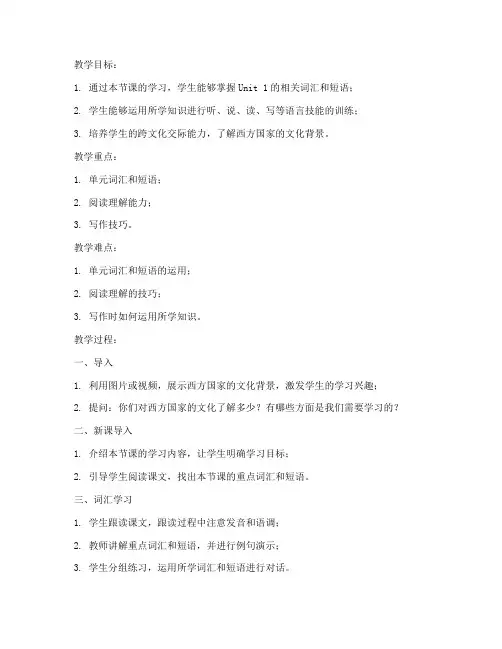
教学目标:1. 通过本节课的学习,学生能够掌握Unit 1的相关词汇和短语;2. 学生能够运用所学知识进行听、说、读、写等语言技能的训练;3. 培养学生的跨文化交际能力,了解西方国家的文化背景。
教学重点:1. 单元词汇和短语;2. 阅读理解能力;3. 写作技巧。
教学难点:1. 单元词汇和短语的运用;2. 阅读理解的技巧;3. 写作时如何运用所学知识。
教学过程:一、导入1. 利用图片或视频,展示西方国家的文化背景,激发学生的学习兴趣;2. 提问:你们对西方国家的文化了解多少?有哪些方面是我们需要学习的?二、新课导入1. 介绍本节课的学习内容,让学生明确学习目标;2. 引导学生阅读课文,找出本节课的重点词汇和短语。
三、词汇学习1. 学生跟读课文,跟读过程中注意发音和语调;2. 教师讲解重点词汇和短语,并进行例句演示;3. 学生分组练习,运用所学词汇和短语进行对话。
四、阅读理解1. 学生阅读课文,找出文章的主旨大意;2. 教师提问,检查学生的阅读效果;3. 学生分组讨论,分析文章的细节,分享自己的观点。
五、写作训练1. 教师讲解写作技巧,如如何开头、如何结尾、如何组织文章结构等;2. 学生根据所学知识,运用写作技巧进行写作练习;3. 教师批改学生作文,指出不足,并给予指导。
六、课堂小结1. 回顾本节课的学习内容,强调重点词汇和短语;2. 鼓励学生在课后继续复习,巩固所学知识。
七、作业布置1. 复习本节课所学词汇和短语;2. 阅读课文,完成课后练习;3. 准备下一节课的学习内容。
教学反思:本节课通过多种教学手段,如图片、视频、分组讨论等,激发了学生的学习兴趣,提高了他们的学习积极性。
在词汇学习、阅读理解和写作训练等方面,学生取得了较好的效果。
但在实际教学中,还需注意以下几点:1. 加强对学生的个别辅导,关注学生的个体差异;2. 在教学中注重培养学生的跨文化交际能力;3. 提高教学效果,关注学生的实际需求。
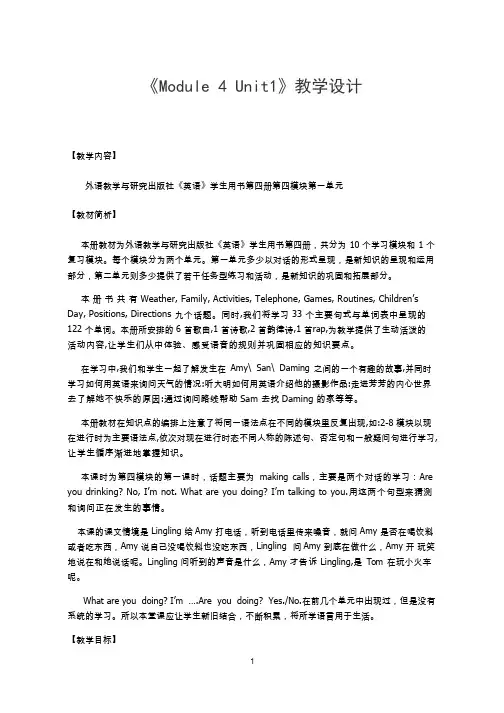
《Module 4 Unit1》教学设计【教学内容】外语教学与研究出版社《英语》学生用书第四册第四模块第一单元【教材简析】本册教材为外语教学与研究出版社《英语》学生用书第四册,共分为10 个学习模块和1 个复习模块。
每个模块分为两个单元。
第一单元多少以对话的形式呈现,是新知识的呈现和运用部分,第二单元则多少提供了若干任务型练习和活动,是新知识的巩固和拓展部分。
本册书共有Weather, Family, Activities, Telephone, Games, Routines, Children’s Day, Positions, Directions 九个话题。
同时,我们将学习33 个主要句式与单词表中呈现的122 个单词。
本册所安排的6 首歌曲,1 首诗歌,2 首韵律诗,1 首rap,为教学提供了生动活泼的活动内容,让学生们从中体验、感受语音的规则并巩固相应的知识要点。
在学习中,我们和学生一起了解发生在Amy\ San\ Daming 之间的一个有趣的故事,并同时学习如何用英语来询问天气的情况:听大明如何用英语介绍他的摄影作品:走进芳芳的内心世界去了解她不快乐的原因:通过询问路线帮助Sam 去找Daming 的家等等。
本册教材在知识点的编排上注意了将同一语法点在不同的模块里反复出现,如:2-8 模块以现在进行时为主要语法点,依次对现在进行时态不同人称的陈述句、否定句和一般疑问句进行学习, 让学生循序渐进地掌握知识。
本课时为第四模块的第一课时,话题主要为making calls,主要是两个对话的学习:Are you drinking? No, I’m not. What are you doing? I’m talking to you.用这两个句型来猜测和询问正在发生的事情。
本课的课文情境是Lingling 给Amy 打电话,听到电话里传来噪音,就问Amy 是否在喝饮料或者吃东西,Amy 说自己没喝饮料也没吃东西,Lingling 问Amy 到底在做什么,Amy 开玩笑地说在和她说话呢。
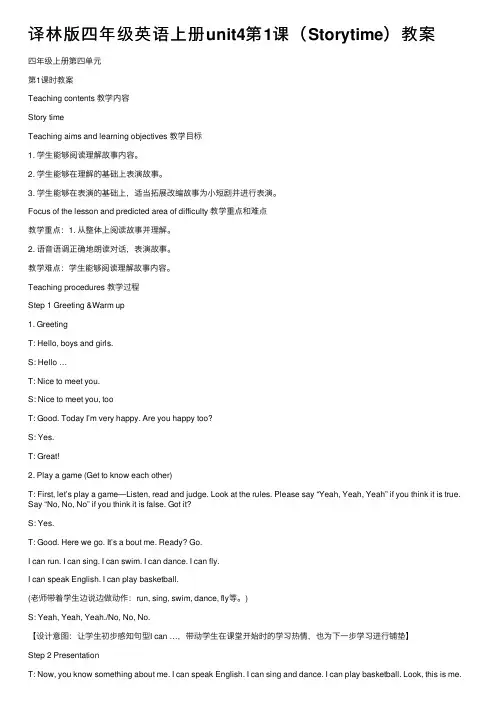
译林版四年级英语上册unit4第1课(Storytime)教案四年级上册第四单元第1课时教案Teaching contents 教学内容Story timeTeaching aims and learning objectives 教学⽬标1. 学⽣能够阅读理解故事内容。
2. 学⽣能够在理解的基础上表演故事。
3. 学⽣能够在表演的基础上,适当拓展改编故事为⼩短剧并进⾏表演。
Focus of the lesson and predicted area of difficulty 教学重点和难点教学重点:1. 从整体上阅读故事并理解。
2. 语⾳语调正确地朗读对话,表演故事。
教学难点:学⽣能够阅读理解故事内容。
Teaching procedures 教学过程Step 1 Greeting &Warm up1. GreetingT: Hello, boys and girls.S: Hello …T: Nice to meet you.S: Nice to meet you, tooT: Good. Today I’m very happy. Are you happy too?S: Yes.T: Great!2. Play a game (Get to know each other)T: First, let’s play a game—Listen, read and judge. Look at the rules. Please say “Yeah, Yeah, Yeah” if you think it is true. Say “No, No, No” if you think it is false. Got it?S: Yes.T: Good. Here we go. It’s a bout me. Ready? Go.I can run. I can sing. I can swim. I can dance. I can fly.I can speak English. I can play basketball.(⽼师带着学⽣边说边做动作:run, sing, swim, dance, fly等。
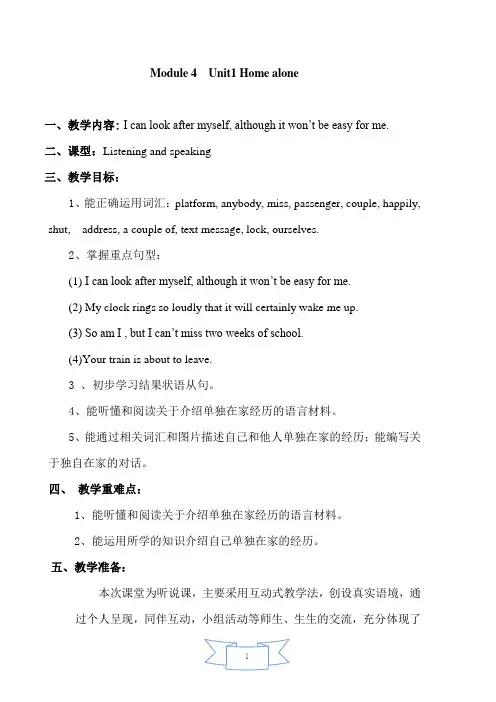
Module 4 Unit1Home alone一、教学内容:I can look after myself, although it won’t be easy for me.二、课型:Listening and speaking三、教学目标:1、能正确运用词汇:platform, anybody, miss, passenger, couple, happily, shut, address, a couple of, text message, lock, ourselves.2、掌握重点句型:(1)I can look after myself, although it won’t be easy for me.(2) My clock rings so loudly that it will certainly wake me up.(3) So am I , but I can’t miss two weeks of school.(4)Your train is about to leave.3 、初步学习结果状语从句。
4、能听懂和阅读关于介绍单独在家经历的语言材料。
5、能通过相关词汇和图片描述自己和他人单独在家的经历;能编写关于独自在家的对话。
四、教学重难点:1、能听懂和阅读关于介绍单独在家经历的语言材料。
2、能运用所学的知识介绍自己单独在家的经历。
五、教学准备:本次课堂为听说课,主要采用互动式教学法,创设真实语境,通过个人呈现,同伴互动,小组活动等师生、生生的交流,充分体现了学生在学习过程中的主体地位,教师只是课堂的引导者,组织者和合作者,让学生在使用中学会英语,综合培养学生的英语语言运用能力。
在教学过程中,采用多媒体手段辅助教学,利用各种图片和习题任务贯穿整个教学过程。
因此,本节课需准备:PPT课件、录音机、课堂练习、奖品。
六、预习要求:1、根据音标自学本课新单词;2、查找相关资料,找出你认为本课较重要的语言点和短语。
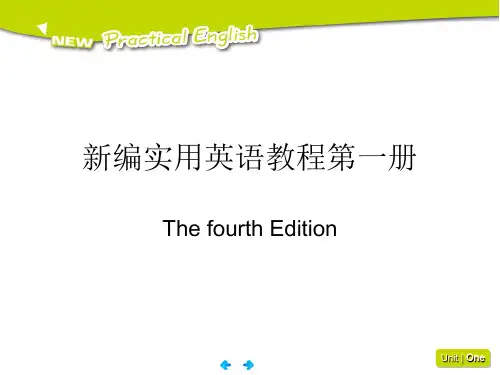
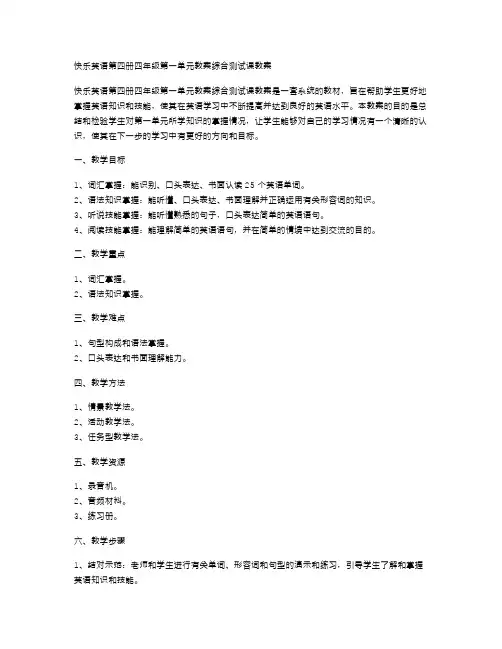
快乐英语第四册四年级第一单元教案综合测试课教案快乐英语第四册四年级第一单元教案综合测试课教案是一套系统的教材,旨在帮助学生更好地掌握英语知识和技能,使其在英语学习中不断提高并达到良好的英语水平。
本教案的目的是总结和检验学生对第一单元所学知识的掌握情况,让学生能够对自己的学习情况有一个清晰的认识,使其在下一步的学习中有更好的方向和目标。
一、教学目标1、词汇掌握:能识别、口头表达、书面认读25个英语单词。
2、语法知识掌握:能听懂、口头表达、书面理解并正确运用有关形容词的知识。
3、听说技能掌握:能听懂熟悉的句子,口头表达简单的英语语句。
4、阅读技能掌握:能理解简单的英语语句,并在简单的情境中达到交流的目的。
二、教学重点1、词汇掌握。
2、语法知识掌握。
三、教学难点1、句型构成和语法掌握。
2、口头表达和书面理解能力。
四、教学方法1、情景教学法。
2、活动教学法。
3、任务型教学法。
五、教学资源1、录音机。
2、音频材料。
3、练习册。
六、教学步骤1、结对示范:老师和学生进行有关单词、形容词和句型的演示和练习,引导学生了解和掌握英语知识和技能。
2、集体练习:老师大声朗读单词、形容词和句型,让学生反复跟读,增加其口语表达和理解能力。
3、活动训练:老师通过绘画、听写等活动,帮助学生加深对知识内容的记忆和理解,并鼓励学生动手、动脑,积极参与。
4、情景教学:老师通过真实、生活化的示范,让学生在真实情境中理解、掌握英语词汇和语法,从而提高其运用能力。
5、难点练习:老师针对学生在单词、形容词和句型掌握方面的不足,采用个别辅导、小组讨论等教学方法进行复习和练习。
6、复习测试:老师将所学知识通过总复习,让学生在课堂上进行测试,并根据测试结果进行分析和评估。
七、教学评价通过教学,学生能够较好地掌握所学英语知识和技能,其中词汇掌握和口头表达能力得到了较好的提高。
但在语法知识方面仍存在较大的掌握难度,需要进一步加强练习和辅导。
同时,需要进一步培养学生的学习兴趣和积极性,从而提高其英语学习的效果和成果。
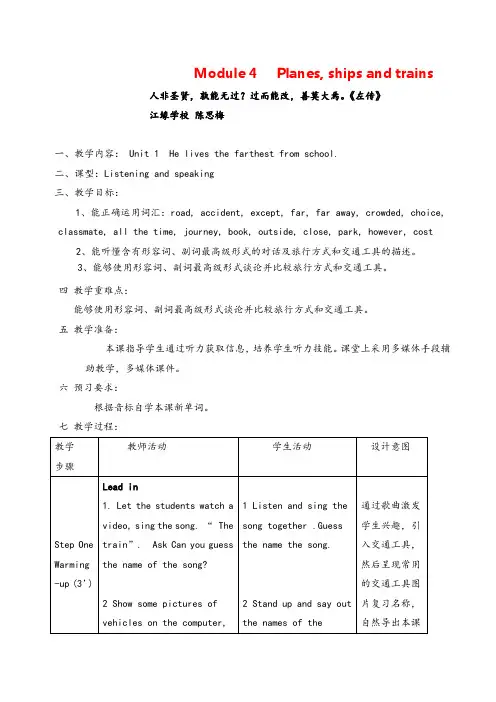
Module 4 Planes, ships and trains人非圣贤,孰能无过?过而能改,善莫大焉。
《左传》江缘学校陈思梅一、教学内容: Unit 1 He lives the farthest from school.二、课型:Listening and speaking三、教学目标:1、能正确运用词汇:road, accident, except, far, far away, crowded, choice, classmate, all the time, journey, book, outside, close, park, however, cost2、能听懂含有形容词、副词最高级形式的对话及旅行方式和交通工具的描述。
3、能够使用形容词、副词最高级形式谈论并比较旅行方式和交通工具。
四教学重难点:能够使用形容词、副词最高级形式谈论并比较旅行方式和交通工具。
五教学准备:本课指导学生通过听力获取信息,培养学生听力技能。
课堂上采用多媒体手段辅助教学,多媒体课件。
六预习要求:根据音标自学本课新单词。
七教学过程:达标训练题A. 随学随练:写出下列单词的最高级形式:1. short _________________2. nice _________________3. big _________________4. thin _________________5. early _________________6. slowly _________________7. beautiful _________________ 8. carefully _________________9. badly _________________ 10. much _________________11. little _________________ 12. far __________________B. 单项选择:( ) 1. Debbie is growing fast. She is even________ than her mother.A. tallB. tallerC. tallestD. the tallest ( )2.—Dad, would you please drive ________?— No hurry. We have enough time before the plane takes off.A. fasterB. more slowlyC. more carefully( ) 3.—Do you know Lin Shuhao?—Yes. He is one of _____ basketball players in the NBA.A. popularB. more popularC. the most popular( ) 4. Is Lily’s home _____ away from school than Linda’s?A. farB. fartherC. farthest .( ) 5.—Who ran ______ of all in the sports meeting?—Hector did, I think.A. fastB. fasterC. the fastestD. most fast( ) 6. Li Na is ________ tennis player in China now.A. most famousB. the most famousC. more famous【素材积累】辛弃疾忧国忧民辛弃疾曾写《美芹十论》献给宋孝宗。
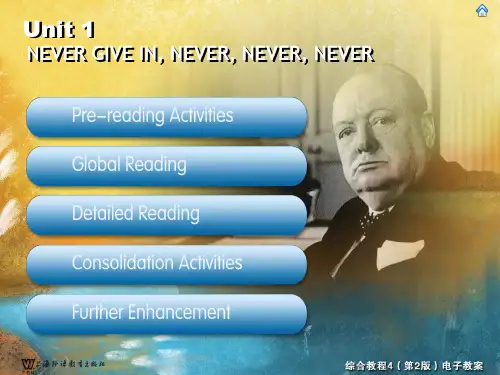
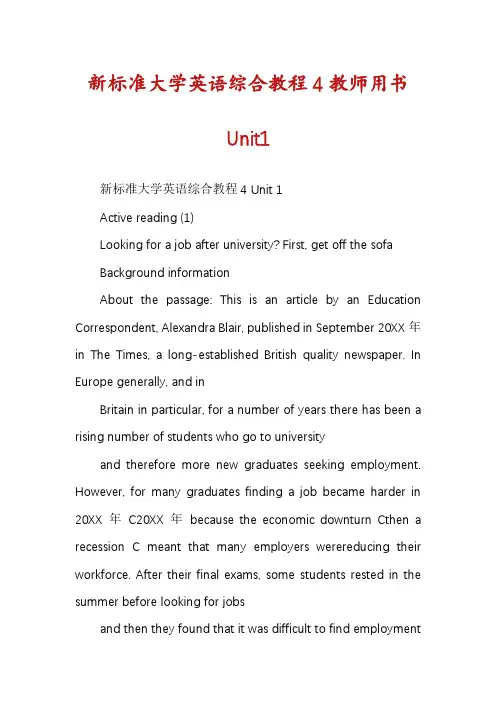
新标准大学英语综合教程4教师用书Unit1新标准大学英语综合教程4 Unit 1Active reading (1)Looking for a job after university? First, get off the sofaBackground informationAbout the passage: This is an article by an Education Correspondent, Alexandra Blair, published in September 20XX年in The Times, a long-established British quality newspaper. In Europe generally, and inBritain in particular, for a number of years there has been a rising number of students who go to universityand therefore more new graduates seeking employment. However, for many graduates finding a job became harder in 20XX年C20XX年because the economic downturn Cthen a recession C meant that many employers werereducing their workforce. After their final exams, some students rested in the summer before looking for jobsand then they found that it was difficult to find employmentin their field or at the level they wanted. Thearticle addresses the problems of such new graduates who might be stuck at home and advises their parentsto be there for their children (ie to be available if their children want to talk about the problem or if theyneed help). The article recommends finding work in a bar or supermarket rather than sitting unemployed at home since this is more likely to lead to better employment later. The style is partly of a report, but alsoof a humorous comment for light entertainment (seen in the jokey language and problem-solving advice toparents).Why finding a job in 20XX年is so difficult for university graduates?Universities in Europe, particularly in Britain, have expanded greatly in the last fifteen years (over 45% ofyoung adults now go on to higher education), so there are more graduates looking for jobs. This competitivesituation became a lot worse in 20XX年onwards with the credit crunch and economic depression, which meant that there were fewer jobs available and a rise inunemployment. Thus new graduates have to be active to seek a job, they need to fill in many application forms and try to get job interviews: they won’t findemployment by lying on the sofa at home.Culture pointshonours degree: Traditionally, in the British university system, BA and BSc honours degrees are awardedin different categories: a first class degree (written using Roman numbers as I), a second (divided into twosubcategories, written as IIii and IIii, which are called “a two one” and “a two two”), a third(written III) anda pass degree. Most people get a second. There are also ordinary degrees with more general courses of studywithout these categories.Generation Y and Grunt: The main idea here is that there is a succession of different generations orcohorts of adults who come into the workforce in North America which are given different informal namesto characterize them. First, “Baby boomers” were born in the great increase (the boom) of birt hs after WorldWar II (1946C1960), followed by “Generation X” people (born 1960C1980) who were said to bring newattitudes of being independent, informal, entrepreneurial, and expected to get skills and have a career beforethem. “GenerationY” or the “Millenial Generation” (born 1980s and 1990s and becoming adult in the newmillenium) are now making up an increasing percentage of the workforce; they are said to be spoilt by dotingparents, to have structured lives, to be used to teamwork and diverse people in a multicultural society. Inthe passage, this generation is now becoming (morphing into) Generation Grunt, which is an ironic namereferring to repetitive, low status, routine or mindless work Cthis may be the only work available to somegraduates, who may have to take very ordinary jobs to get experience before they find something more suitable. “Grunt” also refers to coarse behaviour or bad manners and to the deep sound that is made by a pig;when people “grunt” they express disgust but do not communi cate with words C this may be how the parents of new graduates think their children communicate withthem!A comprehensive refers to a British type of secondary school which became popular in the1960s. Before thatthere were academic “grammar schools” and more general “secondary modern” schools for those who didnot pass the grammar school entrance tests, but the comprehensive schools were designed for all students ina social philosophy of bringing diverse students together whether they were academic or not. Those studentswho went to a comprehensive school probably felt that had to study particularly hard (I worked my backsideoff) to get to university, compared to those who went to grammar schools where all students were academic Ccomprehensive students felt they had to struggle to get to university.Chicken suit This refers to a large yellow costume that someone wears which makes the person look like agiant chicken. Before he became a famous actor, Brad Pitt once dressed in such a costume when he had a jobadvertising for a restaurant called El Pollo Loco (The Crazy Chicken’ in Spanish) C the job meant that he hadto walk around the streets like a chicken to attract customers to come to the restaurant.Language points1 Those memories of forking out thousands of pounds a year so that he could eat well and go to the odd party, began to fade. Until now. (Para 1)The parents paid a lot of money for their son’s university fees and living expenses (so that he could eatwell) and for occasional social events Cat graduation these memories of money were mostly forgotten because the parents were proud. But now the parents are thinking of money again because the son doesn’t have a job and doesn’t seem to be actively seeking one.2 This former scion of Generation Y has morphed overnight into a member of Generation Grunt. (Para 2)The distinguished son of Generation X (of the parents’ generation who worked hard, got jobs, and hadgood careers and expected their son to do the same) has changed into a member of Generation Grunt C hedoesn’t seem to communicate much, lies around and doesn’t get a job (or can only do a low status routingjob).3 I passed the exams, but at the interviews they accused me of being ‘too detached’ and talking inlanguage that was ‘too technocratic’, which I didn’t think possible, but obviously it is. (Para 5)He passed the entrance exams for a government post, but he was criticized in the selection interviews: They said he was detached (not personally involved) and too technocratic (he used the language of atechnical expert or high authority). As a new graduate he probably wanted to show his expertise in hislanguage so he can’t u nderstand this criticism.4 For the rest it is 9-to-5 “chilling” before heading to the pub. (Para 6)The others who do not have a routine low status job (like stacking goods on a supermarket shelf) chill outall day (they spend their time casually relaxing Cthey don’t look for work) and go to pub for a drink in theevening.5 I went to a comprehensive and I worked my bac kside off to go to a good university …(Para 6) He went to a school forstudents of all abilities (not to a special school for academic students) and so hehad to work very hard to enter a good university: Your backside means your bottom Cthe part of your body that you sit on Cto work your backside off is informal and it means you work very hard indeed.6 … bu t having worked full-time since leaving school herself, she and her husband find it tricky toadvise him on how to proceed. (Para 7)The mother has always had a full-time job (presumably the father is also working full-time), so she doesnot have relevant personal experience. For her, it is tricky to give advice (difficult to do).7 Carry on life as normal and don’t allow them to abuse your bank accoun t or sap your reserve of emotional energy. (Para 11) The advice from Gael Lindenfield here is that parents should live as usual. They should neither let theirchildren spend the parents’ money unnecessarily, nor let the problem take away all their energy andemotions. Sap their reserve means use up their store of emotional energy.8 After that the son or daughter needs to be nudged firmly back into the saddle. (Para 12) Then the parents should gently push their children firmly so that they get back into control of their lives.Reading and understanding2 Choose the best answer to the questions.Teaching tipsGo over the correct answers with Ss and ask them to explain why the other answers are wrong (See below).1 Why hasn’t Jack Goodwin got a job yet?(a) He doesn’t have a very good degree.(No, he has a 2:1 which is considered a good degree. )(b) He refuses to apply for jobs with low salaries.(He feels he should get a better job after studying at university.)(c) It isn’t easy to get a job in the current fi nancial climate.(This may be true but the passage does not mention this.)(d) He prefers to stay at home and help his family.(No, he doesn’t seem to be helping his family: he watches TV and talks to friends.)2 How does he spend a typical day?(a) Doing a temporary job.(No, some of his friends are working in temporary jobs but he doesn’t want to do this.)(b) Watching television.(He watches TV a lot.)(c) Queuing up in the university careers service.(No, he went there once but he didn’t want to queu e s o he walked away.)(d) Preparing for the next job interview.(No, he doesn’t seem to be preparing for interviews.)3 How do most of his friends spend the day?(a) They do nothing all day and go to the pub in the evening.(All except one of them do nothing except chill, then they go to the pub.)(b) They do outdoor activities such as sailing.(No, none of them seem to do outdoor activities; there is no mention of sailing.)(c) They are forced to work by their parents.(No, only one of them has been forced out to stack shelves by his parents; the others seem to be like Jack.)(d) They do part-time jobs such as working in a bar.(No, the text mentions bar work but none of Jack’s friends seem to do this work.)4 How are Jack’s parents helping him?(a) By looking for jobs for him.(No, Jack has tried to get a job himself; there’s nothing here about his parents helping him look for ajob.)(b) By paying for a trip to South America.(No, although he is going on a three-week trip to South America, the passage does not say that Jack’s parents have paid for this.)(c) By gradually making him more financially aware.(The passage does not say so explicitly, but this is the implication about the cut-off point after thetrip when he may be expected to pay rent and contribute to the household bills.)(d) By threatening to throw him out of the house.(No, they haven’t threatened to do this, but they definitely want him to work after he gets back fromhis trip.)5 What does Gael Lindenfield say about Jack’s parents?(a) They ha ve not really understood Jack’s problems.(No, she doesn’t say this; she says they must balance being positive with not making life too comfortable. This doesn’t mean they haven’t understood Jack’s problems.)(b) They have made life too comfortable for Jack.(No, she says they must balance comfort with being positive. This doesn’t necessarily mean that they have already made life too comfortable for Jack.)(c) The approach they have chosen is the right one.(She says they have struck exactly the right note.)(d) They need help from a psychologist.(No, she doesn’t say this.)6 What do Whoopi Goldberg, Bruce Willis and Brad Pitt have in common?(a) They all did bar work before going to university.(No, we don’t know from the passage if any of them did this.)(b) They took part in protests against nuclear power plants.(No, we don’t know is any of them did this)(c) They learnt to act by dressing up as giant chickens.(No, only Brad Pitt did this.)(d) They all did temporary jobs at one stage in their lives.(This is right, although they all had completely different temporary jobs.)Dealing with unfamiliar words3 Match the words in the box with their definitions.1 to make progress by moving to the next stage in a series of actions or events (proceed)2 the process of changing from one situation, form or state to another (transition)3 not feeling involved with someone or something in a close or emotional way (detached)4 referring to something which will happen soon (upcoming)5 to be sitting still in a position that is not upright (slump)6 to return to a previous state or way of behaving (revert)7 to say what happened (recount)4 Complete the paragraph with the correct form of the words in Activity 3.It isn’t easy to make the (1) transition from a busy university student to an unemployed young adult (2) slumped on a bar stool or half watching a mindless television show, wondering if and how their careeris going to (3) proceed. Many people who have experienceda long period of inactivity like this, when (4) recounting how they felt at the time, refer to the same strange psychological effect. As the days pass,they begin to feel (5) detached from any sense of pressure to go and look for a job, and tend to regard (6) upcoming interviews as if they were not very important. Typically, back at home after three or fouryears away, they (7) revert to old habits, start seeing old friends, and, in many cases, become dependentagain on their parents.5 Replace the underlined words with the correct form of the words in the box. You may need to make other changes.1 I went to a mixed-ability secondary school just outside London. (comprehensive)2 I got stopped by a policeman who asked to see my driving licence. (cop)3 Have you seen this beautiful from the air view of Oxford? (aerial)4 Isabel tightly her bag as she walked down the corridor towards the office. (clutched)5 You should speak to Toby; he’s an supporter of flexibleworking hours. (advocate)6 I hurt my leg badly a couple of months ago, and it still hasn’t got b e tter completely. (healed) 6 Answer the questions about the words.1 Is a dead-end job one with (a) exciting prospects, or (b) no future?2 Is a tricky problem (a) difficult, or (b) easy to solve?3 If an activity saps all your energy, do you feel (a) tired, or(b) more active than usual?4 Does a pushy person try to (a) persuade you to do something you don’t want to, or (b) help you bylistening to what you have to say?5 If you feel apathy, do you want to (a) change the world, or(b) stay at home and do nothing?7 Answer the questions about the phrases.1 Is fork out (a) a formal, or (b) an informal way of saying to pay for something?2 If you are in the same boat as another person, are you (a) making the same journey together, or(b) inthe same difficult or unpleasant situation?3 If you feel you have come full circle, do you (a) feel you are back where you started, or (b) feela senseof satisfaction because you have completed something?4 If someone takes a soft line, do they deal with a person (a) in a kind and sympathetic way, or (b) in alazy way without making a decision?5 If you strike the right note about something, are you expressing yourself (a) well, or (b) badly?6 If you do something by all means, do you (a) try your best to do it, or (b) not care about it?7 If you nudge someone back into the saddle, are you encouraging them to (a) take responsibility again, or(b) take it easy?8 If you talk through a problem with someone, do you (a) examine it carefully and sensitively, or(b) referto it quickly and then change the subject?Reading and interpreting8 Answer the questions.1 “Will he ever get a job?” Who is asking this question? Whatmood does it express?The parents are asking this because the paragraph is addressed to parents (earlier it sa ys “your graduateson”). The mood seems to express patience or resignation because the word “ever” suggests that gettinga job will take a long time.2 Who describes Generation Y as “rebels without a cause”? Is it a fair description?This is the writer’s d escription to indicate that this generation is rebelling against parents or society,but they have nothing particular to rebel against. This doesn’t seem very fair because the students aretrying to find work Cit is just that they don’t like their parents nagging them. So they are a bit rebelliousagainst their parents, but no more than that.3 Jack “walked int o the university careers service and straight back out again”. What does this suggestabout Jack’s character?It suggests that Jack is not very determined. As soon as he saw the queue he left without waiting andwithout trying to ask about jobs or careers.4 Jack spent the summer “hiding”. Hiding from what? Why are quotation marks used?Probably this means he was hiding from the world of work, staying at home and not looking for a job. The quotation marks tell us that he wasn’t literally hiding, he just spent a lot of time at home.5 How is Mrs Goodwin’s point of view affected by her own personal experience?In one way her experience hasn’t affected he r attitude: She left school and went immediately to a job(without going to university) and has been working full-time since then and yet she is sympathetic andtakes a soft line.6 How is Lindenfield’s point of view affected by her own personal experience?Her personal experience was that she worked in a bar before finding her first proper job as an aerial photographic assistant. So she says such work is a great networking opportunity. If new graduates aregood at such work and bright, cheerful and polite, they willsoon be promoted. Her personal experience thus reflects C or perhaps has created C her point of view.7 What would the first two paragraphs have focused on if they had been presented from the point of viewof the students rather than the parents?The first two paragraphs would have focused on the need for the new graduates to rest for a bit after their hard studies. It is OK for students to relax with the TV or to socialize with friends for a while, thenthey can start a serious search for employment after that.Active reading (2)If you ask meBackground informationThis is an informal and personalized account of an economics graduate who gets a job in a pub for a year and then has an opportunity to be successful (a lucky break). She works in a L ondon pub called “The Salisbury”or “The Marquis Salisbury”, named after someone who was the British Prime Minister three times between1885 and 1902 and whose family once owned the pub’s land. The 100 year old pub is in Leadenhall Street, just off the CharingCross Road and Leicester Square. Daytime customers can get a pub lunch and evening customers include many office workers and theatre goers (the pub is near many West End theatres). The interior of this pub is dazzling, with large mirrors, cut glass an d a mahog any décor.British pubs are often named after famous people (Robin Hood, The Duke of Wellington) or royalty (The Queen’s Arms, the Prince of Wales) or historical symbols (The Rose and Crown to represent King Edward III, The Royal Oak to represent King Charles II who once hid in a large oak tree). Other names often includecolours and animals (The Red Bull, The Black Horse, The Golden Lion, The Swan) or symbols of traditional trades (The Compasses for carpenters, The Three Hammers for blacksmiths, The Three Tuns forwinemakers).As the pub is a social place to meet as well as a place to get a drink, people often play games like dominoesor darts or join a quiz or competition. A common expression is to “go down the pub” or “go round to thelocal” (bot h meaning to go to the local pub).Culture pointspub in London: A pub is a place where people go for a drink and to meet friends and socialize. People canplay games Csuch as darts, cards, dominoes Cin a pub and pubs often have quiz nights, with prizes for thewinners, and live music (See also Background information) The Salisbury is a well-known pub in central London (See also Background information) London School of Economics is a distinguished university in central London, famous for social sciences. Language points1 If you ask me, real life is not all it’s cracked up to be. (Para 1)In my opinion (If you ask me introduces an opinion), real life is not everything that people say it is. If athing is cracked up to be, people normally praise it but in the opinion of the speaker they are wrong.2 … spending money when you don’t have any is dead easy. (Para 7)Dead here means very. For example, we can say dead tired (exhausted), a dead loss (a complete loss oruseless), a dead weight (very heavy, difficult to lift).3 What were the odds on anyone being so nice? (Para 11)What are the chances that someone would be so nice? The writer is emphasizing here that such kindness isvery unusual.4 … looking back after all these years, you only need one or two break s in your life to succeed. (Para 13)A break here means a chance to be successful. A lucky break is an unexpected opportunity. Reading and understanding2 Choose the best answer to the questions.1 What did the writer want to do after finishing her degree?(a) To do an MA at the London School of Economics.(b) To earn some money to pay off her loan.(c) To start working as soon as possible.(d) To return home and help her mother.2 Why did she ask for a job in The Salisbury?(a) She was hungry and thirsty.(b) She thought it would lead to better things.(c) She was a friend of the landlord.(d) She had the idea when she saw the landlord working.3 What did she buy with her first salary?(a) A bunch of flowers.(b) A CD and a plant for the flat she lived in.(c) A ham sandwich and a glass of beer.(d) She didn’t have any money left after paying the bills.4 Why did Tony give her 20,000?(a) He found out it was her birthday and wanted to help.(b) He trusted her and thought it would help her.(c) He wanted her to leave the pub and work for him.(d) He was secretly in love with her.5 What did she do with the money?(a) She used it to pay for her course at the LSE.(b) She lost a lot of it in the 20XX年stock market crash.(c) She invested it and paid back Tony and other investors.(d) She used it to start her own business.6 Why was Tony pleased when she repaid the loan?(a) He had had an accident and needed the money for a wheelchair.(b) It meant that he would be able to see her again.(c) It proved that he had been right to invest in her.(d) She paid back the loan with a lot of interest.3 Work in pairs and answer the questions.What do we know about the writer’s:1 family background?Her mother had worked hard for 15 years to support her education but couldn’t afford any further support. Her fath er wasn’t around most of the time. He didn’t have any money because he spent it ongambling on dog racing or drinking in pubs.2 career as a student?She had a good degree in economics and wanted to study for a masters course at the London School of Economics.3 ambition?She wanted to get a job in finance or investments in London because then she would be able to use herdegree.4 appreciation of other people?She appreciated Mike’s friendliness with customers and his s kill, and she appreciated Tony as a nice person; later she appreciated the trust of Tony and his friends5 love life?We don’t know much about this, except that she doesn’t like boys to hassle her. She thinks they areimmature.6 financial expertise?It must be quite good: She invested the 20,000 and made enough profit to pay the money back with interest and set up her own company.7 sense of responsibility?She has a strong sense of responsibility because she paid back the money to the investors and paid theman annual interest for the loan.8 philosophy of life?She believes that you should work hard; you may need one or two breaks to succeed but you should know how to use the breaks. You should be honest and responsible with people who trust you. Dealing with unfamiliar words4 Match the words in the box with their definitions.1 funny or entertaining (amusing)2 used for emphasizing that something good has happened, especially because of good luck (fortunately)3 an amount of money that a person, business or country borrows, usually from a bank (loan)4 to take an amount or number from a total (deduct)5 the most exciting, impressive, or interesting part of anevent (highlight)6 to show that you understand someone’s problems (sympathize)7 needing a lot of time, ability, and energy (demanding)5 Complete the conversation with the correct form of the words in Activity 4.Teaching tipsWhen Ss have completed the blanks with the correct form of the appropriate words, ask them to practice reading the dialogue, trying to make their reading sound as conversational as possible. Choose a pair toperform their reading to the class. The class listens and gives the performing pair a rating on a scale of 1-10for fluency and naturalness.A After three years at univers ity, I’m now quite heavily in debt.B I (1) sympathize with you, I know what it’s like to have financial problems. But (2) fortunately I didn’tneed to take out a student (3) loan when I was at university, because I had a part-time job.A What did you do?B I worked in a restaurant at weekends.A That must have been very (4) demanding.B Yes, it was. I had to get the right balance between work and study. But the other people who worked there were good fun to be with, so it was quite (5) amusing too. The (6) highlight of the weekend wasalways Saturday night when we worked overtime.A But I don’t expect you made a lot of money?B No, there wasn’t much after they’d (7) deducted tax and pension contributions. But it was enough tokeep me going.6 Replace the underlined words with the correct form of the words in the box. You may need to make other changes.1 When I was at college I kept all my personal things in an old cupboard.2 A lot of people who leave university before getting a degree end up in good jobs.3 I think she’ll get a good degree, but I wouldn’t risk my money on the exact result.4 The money I spent at college was more than what I earned in my part-time job.5 The chances of my being offered a job after that interview must be quite remote.6 Our business has done very well since we changed our advertising.7 I think telling the truth and not cheating is always the best policy.Key: (1) belongings (2) dropouts (3) gamble (4) exceeded (5) odds(6) has thrived (7) honesty7 Answer the questions about the words and expressions.1 If something is not all it’s cracked up to be, is it (a) valid and interesting, or (b) just a little bitdisappointing?2 If someone keeps banging on about something, are you likely to be (a) interested in, or (b) bored bywhat they say?3 If there is a lot of hassle in your life, are you likely to feel (a) stressed, or (b) relaxed?4 If something happens out of the blue, is it (a) unexpected, or (b) part of your plan?5 If you say you ended up in a particular job, do you suggestthat (a) you have fulfilled your ambition, or(b) it happened almost by chance?6 Are the regulars in a pub (a) the customers who come very often, or (b) the food the pub offers mostoften?7 If something is dead easy, is it (a) very easy, or (b) not easy at all?8 If you treat someone to something, do you (a) buy something nice for them, or (b) behave badly to them?9 If you cheer a place up, do you (a) make the place look brighter, or (b) make the people in the placehappier?Reading and interpreting8 Look at the sentences from the passage and identify the style features.1 Twelve years at school and three years at university, teachers banging on about opportunities in the bigwide world beyond our sheltered life as students, and what do I find?This shows the informality of an incomplete sentence in the first part, the use of an informal expression。
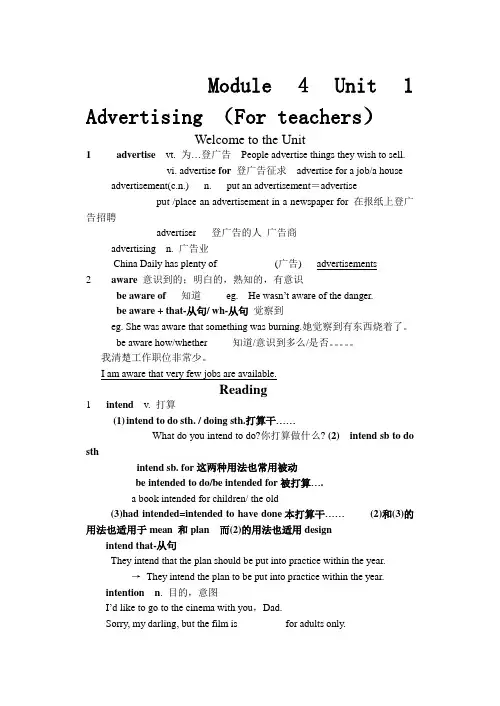
Module 4 Unit 1 Advertising (For teachers)Welcome to the Unit1 advertise vt. 为…登广告People advertise things they wish to sell.vi. advertise for登广告征求advertise for a job/a house advertisement(c.n.) n. put an advertisement=advertiseput /place an advertisement in a newspaper for 在报纸上登广告招聘advertiser 登广告的人广告商advertising n. 广告业China Daily has plenty of ___________(广告) advertisements2 aware意识到的;明白的,熟知的,有意识be aware of知道eg. He wasn’t aware of the danger.be aware + that-从句/ wh-从句觉察到eg. She was aware that something was burning.她觉察到有东西烧着了。
be aware how/whether 知道/意识到多么/是否。
我清楚工作职位非常少。
I am aware that very few jobs are available.Reading1 intend v. 打算(1)intend to do sth. / doing sth.打算干……What do you intend to do?你打算做什么? (2) intend sb to do sthintend sb. for这两种用法也常用被动be intended to do/be intended for被打算….a book intended for children/ the old(3)had intended=intended to have done本打算干……(2)和(3)的用法也适用于mean 和plan 而(2)的用法也适用designintend that-从句They intend that the plan should be put into practice within the year.→They intend the plan to be put into practice within the year.intention n. 目的,意图I’d like to go to the cinema with you,Dad.Sorry, my darling, but the film is _________for adults only.A admittedB intendedC promisedD permitted (B)2 。
一、课题《大学英语综合教程4》Unit 1:Great Expectations二、教学目的1. 知识与技能:通过本单元的学习,学生能够掌握有关期望、梦想和现实的相关词汇和短语,提高英语阅读、写作和翻译能力。
2. 过程与方法:通过阅读、讨论、小组合作等活动,培养学生自主学习、合作学习的能力。
3. 情感态度与价值观:引导学生树立正确的人生观,关注社会现象,培养积极向上的精神风貌。
三、课型新授课四、课时2课时五、教学重点1. 理解文章主题,掌握文章结构。
2. 掌握相关词汇和短语,提高英语阅读能力。
3. 学会运用所学知识进行写作和翻译。
六、教学难点1. 理解文章中复杂的比喻和象征意义。
2. 运用所学词汇和短语进行写作和翻译。
七、教学过程第一课时(一)导入新课1. 教师展示一张关于梦想的图片,引导学生谈论自己的梦想。
2. 学生分享自己的梦想,教师总结并引出本单元主题:Great Expectations。
(二)讲授新课1. 学生自主阅读课文,了解文章大意。
2. 教师讲解课文中的生词和短语,帮助学生理解文章内容。
3. 分析文章结构,引导学生理解文章主题。
(三)巩固练习1. 学生完成课后练习题,巩固所学知识。
2. 教师讲解练习题中的难点,帮助学生掌握解题技巧。
第二课时(一)复习导入1. 复习上节课所学内容,检查学生对课文的理解程度。
2. 教师提问,引导学生思考:梦想与现实的关系。
(二)写作训练1. 学生根据所学知识,写一篇关于梦想与现实的文章。
2. 教师点评学生的文章,指出优点和不足,并给予指导。
(三)翻译练习1. 学生翻译课文中的段落,提高英语翻译能力。
2. 教师讲解翻译技巧,帮助学生掌握翻译方法。
(四)课堂小结1. 教师总结本单元所学内容,强调重点和难点。
2. 学生分享学习心得,教师点评。
八、板书设计Unit 1:Great Expectations1. 梦想与现实2. 词汇和短语3. 写作和翻译技巧九、教具准备1. 课件2. 生词卡片3. 课堂练习题十、作业布置1. 阅读课文,完成课后练习题。
Module4 Unit1 It’s mine!教案临川十一小小学付江燕(一)教学目标:一)知识目标:1、能够听、说It’s mine. / It’s his./ It’s hers./ It’s Lingling’s./ It isn’t hers./It isn’t his.并能综合运用新、旧知识组织对话完成一定交际任务。
二)情感目标:①进一步提高学生对英语的学习热情,增强学习爱好。
②培养学生积极主动地参与课堂活动,大胆开口,主动模拟。
③通过本课的学习培养学生爱卫生、爱干净的良好品质。
三)学习策略目标:能够在学习和课堂活动中集中留意力15-20分钟。
(二)教学重点难点:1、教学重点:把握描述他人或自己的东西的句型It’s mine. / It’s his. / It’s hers. / It’s Lingling’s. / It isn’t hers. /It isn’t his。
2、教学难点:名词性物主代词的运用。
三教学过程:Step1. Warm-up1.Greetings2.Devided groups.3.Let’s play a game. O K? Listen and do the actions.T: Point to my head.Point to your head.Point to his head.Point to her head.T:Do the actions.T:Say and point together.在教学伊始,设计了学生喜爱的chant,由慢到快,训练学生的反映能力,活跃课堂气氛,可以使学生精神饱满,思想集中,使学生在动手动嘴的过程中不知不觉进入新课。
同时,练习了形容词性物主代词,为本课学习名词性物主代词打下坚实的基础。
这一活动真正起到了预热作用。
Step2 Presentation 引入新知,层层突破第一环节:1.师指着预备好的书包、课本、铅笔、大衣等物品说:“Look, there are something on the desk. Whose bag is it? Whose book is it? Whose coat is it?(从这引入新课,充分利用有限的资源,给学生创设一种真实的教学环境,培养他们的爱好。
Unit One I Wandered Lonely as a Cloud
第一单元我像一朵浮云孤独的游荡着——8学时I.Aims (教学目标)
II.Teaching hours and teaching method (课时分配和教学方法)
III.Language points (语言点,课文重点和难点)
IV.Grammar (语法点)
V.Homework (作业)
I.Aims (教学目标)
①PART1:Learning to describe a place in location,and its natural features
Learning to talk about and appreciate the poem I Wandered Lonely as a Cloud
②PART2:Learning to read an article about natural beauty of the Lake District in England
Learning to talk about its geographical,historical,and cultural characteristics
Learning to use related phrases and expressions in the article for the description of a
place that students are familiar with
③PART3:Practicing reading more about tourist attractions
Practicing the use of related vocabulary of tourist attractions
Learning to use v-ing structure for setting background information for an event in a
Sentence
II.Teaching Hours and Teaching Method (课时分配和教学方法)
6 periods:Text analysis
Method: Give the detailed explanation to each sentence and each new word, and give at least one example about the usage of the new word and new phrase;
Lead students try to use those learned words and phrases in this unit to show their opinions.
2 periods:Do all the exercises in the text in class.
III. Language points (语言点)
New Words and phrases in the Text:(词汇学习)
①PART1: a host of the Milky Way sprightly glee out-did jocund inward eye
vacant pensive
②PART2:tuck away verdant spectacularly lush quintessentially stride idyllic
pedigree extraordinary evocative wonder attest stunning possession
stroll descent mortify craggy crumple imposing compact inspire
awe inspire pedigree glacial evocative gush steeply
③PART3: scramble approach roam get irrevocably lost flee vendor flourish
Teaching Method:
Try to use an English context to explain those words above or sometimes we just need to
give students some synonyms they have learned before.
Ⅳ.Grammar (语法点)
1. Let students try to find v-ing structure in the article and at the same time try to translate those
sentences by themselves;
2. According to the way of feeling the v-ing structure sentences, students could try to conclude the rule of it by themselves first
3. After that ,it’s time for the teacher to explain
Ⅴ.Homework (课后作业,全收全改)
1.Try to translate the poem
2. Grammar work (page13)
3. Vocabulary work (page 14)。